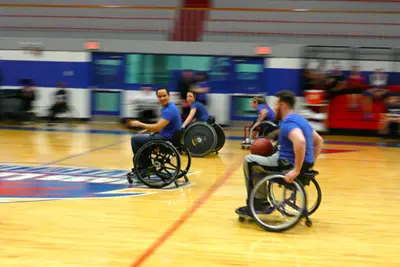Exercise Physiology Students Instill Confidence, Motivation
 Image by Chris Lisinski/Nashoba Valley Voice
Image by Chris Lisinski/Nashoba Valley Voice
05/18/2016
By Karen Angelo
Exercise Physiology senior Hailey Tompkins ran alongside 9-year-old Declan Wilkins of Lowell, giving him tips as he cautiously pedaled his bicycle.
“My rider was extremely timid, but by the end of the week he was able to go bursts of time where he was riding his bike without any help,” says Tompkins, one of 52 exercise physiology students who recently volunteered to teach children, teens and young adults with disabilities how to ride a bike.
Run by the non-profit organization iCan Shine, the one-week bike camp is the service-learning component of the advanced study course taught by Exercise Physiology Asst. Prof. Yi-Ning Wu.
“This bike camp is a great fit for our advanced study course because it aligns perfectly with the content of the class, which is exercise for people with special needs such as stroke, cerebral palsy, Down syndrome and autistic spectrum disorder,” Wu says. “This experiential learning reinforces how to interact with individuals with special needs and their caregivers during exercise.”
The students applied their exercise physiology skills by making assessments on the spot and giving advice.
“By assessing any physiological issues the riders were encountering, I got the best out of my rider,” says Exercise Physiology major Louis Tarantino. “I was better able to alter or cue my rider based on his body and motions because of my education, allowing me to be more comfortable with my rider as he developed the skills to ride.”
Once her rider was on a two-wheeled bike, student Ashley Michals could see the imbalance between his two sides.
“My rider would tip his whole body to turn, so cues like ‘tighten your belly!’ worked much better than telling him to straighten his back,” she says. “Knowing the muscle groups and angles definitely helped me provide these cues.”
Pediatric and Neurological Specialist Mary Evans of Emerson Hospital’s Center for Sports and Sports Therapies, who organized the camp and worked with the exercise physiology students, appreciated the energy and compassion the students brought to the riders.
“The students from UMass Lowell were reliable, energetic and fun,” she says. “I noticed that when they engaged with the campers, they treated them with respect, which was especially helpful for the teenage and young adult riders.”
Bigger than Bike Riding
During the week, the students witnessed the campers gain confidence and independence.
“They were not just learning to ride a bike,” says Michals. “They were learning how to be independent and face their fears in other aspects of their lives as well by learning a skill that they had struggled with before.”
Tarantino says the experience shed light on the capability and potential of people with disabilities.
“They may learn in a different manner or environment, but they can do it,” he says.


